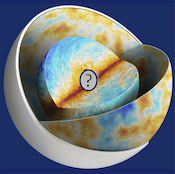Orateur
Description
Galaxy clusters are a powerful cosmological probe, being able to describe the latest evolution of large scale structure.
In recent years, cluster catalogs of thousands of objects have been detected in the mm wavelengths, through the thermal Sunyaev-Zeldovich effect. CMB experiments have therefore a fundamental role also in providing observables for the recent evolution of the Universe.
The cluster mass calibration provides the largest source of uncertainties in current cluster cosmology. Indeed, since we can not measure directly cluster masses, the cosmological analysis relies on scaling relations between the survey observable (proportional to the Compton parameter, for clusters detected with tSZ effect) and the cluster mass. I will review the state of the art for tSZ cluster cosmology, focusing in particular on a novel analysis of Planck data.
I will also show results for the first combined analysis of Planck and SPT cluster catalogs. In this first analysis, we provide a mass calibration for Planck clusters completely independent on theoretical assumptions, simply using the constraining power of SPT clusters.
We show therefore the huge potentiality of combining catalogs from different experiments, in improving the cosmological analysis and the treatment of different systematic uncertainties.
